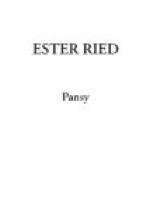they would. I should like to get a nearer view
of that trimming around her sack; it is lovely whatever
it is.—’And the light shineth in
darkness; and the darkness comprehended it not.’”
Now it was doubtful if it had once occurred to Ester
who this glorious “Word” was, or that He
had aught to do with her. Certainly the wonderful
and gracious truths embodied in these precious verses,
truths which had to do with every hour of her life,
had not this evening so much as made an entrance into
her busy brain; and yet she actually thought herself
in the way of getting rid of the troublesome thoughts
that had haunted her the days just past. The
verses were being read aloud, the thoughts about the
troublesome hair and the trimmings on Miss Hastings’
sack were suffered to remain thoughts, not to put
into words—had they been perhaps even Ester
would have noticed the glaring incongruity. As
it was she continued her two occupations, reading
the verses, thinking the thoughts, until at last she
came to a sudden pause, and silence reigned in the
room for several minutes; then there flushed over
Ester’s face a sudden glow, as she realized
that she sat, Bible in hand, one corner of the solemnly-worded
card marking the verse at which she had paused, and
that verse was: “He came unto his own, and
his own received him not.” And she realized
that her thoughts during the silence had been:
“Suppose Miss Hastings should call and should
inquire for her, and she should go with Aunt Helen
to return the call, should she wear mother’s
black lace shawl with her blue silk dress, or simply
the little ruffled cape which matched the dress!
She read that last verse over again, with an uncomfortable
consciousness that she was not getting on very well;
but try as she would, Ester’s thoughts seemed
resolved not to stay with that first chapter of John—they
roved all over New York, visited all the places that
she had seen, and a great many that she wanted to
see, and that seemed beyond her grasp, going on meantime
with the verses, and keeping up a disagreeable undercurrent
of disgust. Over those same restless thoughts
there came a tap at the door, and Maggie’s voice
outside.
“Miss Ried, Miss Abbie sent me to say that there
was company waiting to see you, and if you please
would you come down as soon as you could?”
Ester sprang up. “Very well,” she
responded to Maggie. “I’ll be down
immediately.”
Then she waited to shut the card into her Bible to
keep the place, took a parting peep in the mirror
to see that the brown hair and blue ribbon were in
order, wondered if it were really the Hastings who
called on her, unlocked her door, and made a rapid
passage down the stairs—most unpleasantly
conscious, however, at that very moment that her intentions
of setting herself right had not been carried out,
and also that so far as she had gone it had been a
failure. Truly, after the lapse of so many years,
the light was still shining in darkness.




